Fantasia 2018, Day 14: The Witch: Part 1. The Subversion and Blue My Mind
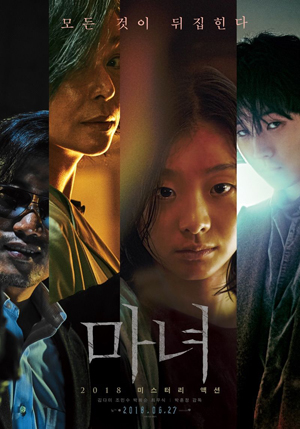 I had two movies on my schedule for Wednesday, July 25. The first was The Witch: Part 1. The Subversion, a Korean action movie with super-hero elements. The second was a German-language Swiss movie called Blue My Mind, about a teenager moving to a new school and finding herself undergoing a strange metamorphosis. Both films were about young women, and both leads had elements of the inhuman to them. But these things were expressed in very different ways.
I had two movies on my schedule for Wednesday, July 25. The first was The Witch: Part 1. The Subversion, a Korean action movie with super-hero elements. The second was a German-language Swiss movie called Blue My Mind, about a teenager moving to a new school and finding herself undergoing a strange metamorphosis. Both films were about young women, and both leads had elements of the inhuman to them. But these things were expressed in very different ways.
The Witch is written and directed by Park Hoon-jung. It begins with mysterious assassins killing gifted children, and one child escaping under cover of night. Ten years later, Ja-yoon (Kim Da-mi) lives in a small town with her adopted parents, hiding her telekinetic powers. But then she wins a nationally-televised talent competition, and the mysterious forces that threatened her when young find her again. Agents of various sorts draw closer to her and her family. Can her powers save her, and them?
This is a fast, intelligent, well-shot film with elements of thriller and super-hero story. It explodes into violence at the end after a build-up of increasing tension, and we neither miss the action earlier nor feel it unearned when it comes. Over two hours long (with a listed running time of 126 minutes), it passes by like a shot. The craftsmanship’s excellent and the pacing’s near-perfect, both in terms of the selection of scenes and also in the rhythm of the editing. Emotional moments come up and are allowed to breathe, but give way to more action-driven sequences in a way that feels natural.
Kim’s acting has to be mentioned here, as her Ja-yoon drives the film and keeps things interesting. She’s quick, funny, and interesting; when we find out what the actual story is behind her and her powers we get a new dimension of understanding to what we’ve already seen, but the point is that Kim’s able to give everyday scenes with Ja-yoon’s family and her best friend (Go Min-si) real interest. Park helps that by keeping a constant sense of tension, establishing mysterious villains and adroitly cutting to them to keep the audience on edge.
I will admit at this point that I’m talking around the story of the film, and that is because there’s a fair-play twist fairly late in the story that’s executed quite well and recontextualises much of what we thought we saw. It’s perfectly logical and, when it’s sprung on us, instantly makes perfect sense. I’d say it’s a good twist because it’s not simply a plot twist — character and theme are definitely involved, and all these aspects of the story benefit. I can say no more, except to observe that The Witch has a well-written and sharply-conceived script; and this twist feels of a piece.
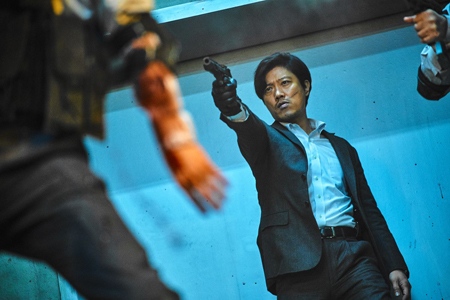 Broadly speaking, this is a movie that does a good job of setting up multiple plot strands and multiple characters, then drawing them all together and giving us full explanations and motivations for everyone. There’s a paranoiac espionage feel to the story, driven by mysterious gunmen in suits and baby-faced killers, and a sense of shadows always lurking at the edge of things; it’s not an especially dark film visually, but it is textured in a way that oddly offsets the sheen of high-tech settings and the homely feel of Ja-yoon’s home town.
Broadly speaking, this is a movie that does a good job of setting up multiple plot strands and multiple characters, then drawing them all together and giving us full explanations and motivations for everyone. There’s a paranoiac espionage feel to the story, driven by mysterious gunmen in suits and baby-faced killers, and a sense of shadows always lurking at the edge of things; it’s not an especially dark film visually, but it is textured in a way that oddly offsets the sheen of high-tech settings and the homely feel of Ja-yoon’s home town.
There’s a reasonable argument that this is an odd kind of super-hero film. It imagines a group of mutated children, creating a group of super-powered individuals with a common origin and power set, but also distinguishes them both visually and in character terms. In fact, the movie reminded me of a certain kind of post-Watchmen super-hero comic. There was a wave of comics in the late 80s that tried to learn from Watchmen and American Flagg! and The Dark Knight Returns in the way that they presented information and introduced characters, super-hero comics that expected the audience to do the work. I’m thinking of things like Elektra: Assassin, New Statesmen, the Shadowline books from Epic Comics, the Helfer-Baker Shadow, probably the Dennis O’Neil Question, even the five-years-later storyline of Legion of Super-Heroes. These were books that allowed mystery to breathe, that tried to tell their story visually, that used complex plots with multiple factions. The Witch feels like a film version of a story along those lines.
But then, if this is a super-hero story, it’s a story that (like a lot of super-hero stories) sails close to being a horror story as well. The more the villains draw near to Ja-yoon the more we worry; this does not feel like a story that’s going to end well. And then the more we find out about the villains and about the experiments that created them, the more horrific things feel — and the more we realise we are looking at a story about monsters. This does not end, really, even when the violence begins. It’s a film that does an admirable job of keeping the audience off-balance, unsure exactly what kind of story they’re seeing.
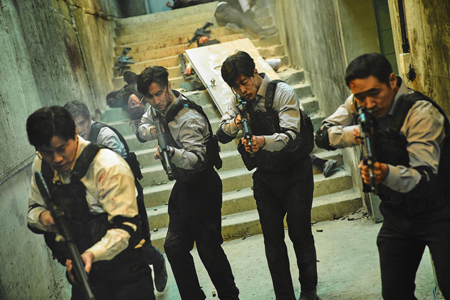 (As an aside, the movie also does something I as an English-speaker found almost thrillingly creepy with its language use. Most of the film is in Korean. But one character in particular is also fluent in English, and has a habit of dropping into English to toss off his most disturbing lines or terrible threats. For me personally this was weirdly effective because the dropping of subtitles made those lines weirdly direct; particularly since the character was often looking into or almost directly into the camera.)
(As an aside, the movie also does something I as an English-speaker found almost thrillingly creepy with its language use. Most of the film is in Korean. But one character in particular is also fluent in English, and has a habit of dropping into English to toss off his most disturbing lines or terrible threats. For me personally this was weirdly effective because the dropping of subtitles made those lines weirdly direct; particularly since the character was often looking into or almost directly into the camera.)
As a story, the movie has some ideas on its mind. There are themes here about nature and nurture, I think (though I should note there’s a crucial plot point it gets wrong about bone marrow transplants, which the movie thinks need to come from a family member but which in fact do not). And also ideas about identity and survival. There’s a final choice made at the end of the film that seems to speak to all these themes, and it feels well-earned — and also happens to set up a sequel. (The very last scene emphasises this, and is unusual in being a scene that I think would have actually worked better as a post-credits sequence.)
The Witch is an engaging morally grey super-hero spy story that begins with a child survivor of terrible tragedy being taken in by a kindly farming couple, and goes in some surprising directions. It’s unnerving and at times bleak, but has a strong sense of redemption by the end. It’s well-crafted, supremely well-acted, intelligent, and has some things to say. It’s a remarkably solid film.
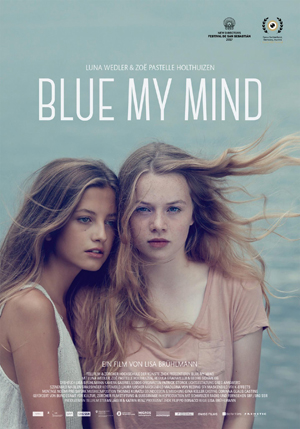 Blue My Mind was an interesting change. Written and directed by Lisa Brühlmann, it follows 15-year-old Mia (Luna Wedler) as she navigates moving to a new school, making friends, and entering the social maze. But at the same time something’s happening to her. Her body’s changing in grotesque ways. She’s finding herself driven by strange and sometimes self-destructive desires. Can she stop what’s happening to her? Does she want to?
Blue My Mind was an interesting change. Written and directed by Lisa Brühlmann, it follows 15-year-old Mia (Luna Wedler) as she navigates moving to a new school, making friends, and entering the social maze. But at the same time something’s happening to her. Her body’s changing in grotesque ways. She’s finding herself driven by strange and sometimes self-destructive desires. Can she stop what’s happening to her? Does she want to?
This is a well-shot movie in a completely different way from The Witch. Instead of a slick sheen and smooth camera moves, the cinematography here is naturalistic, capturing the weird contrasts of light. There’s an overall coolness; blue seems to be everywhere. But it feels real, and that’s the overwhelming sense of the film to me: blue and sunlit, the light almost overpowering, as when vision’s almost too much to bear. Cinematically, this is a powerful film.
Dramatically, I’m not sure it’s as strong. Mia’s social world is very narrow, and her school doesn’t really come alive. She makes friends with a small group that I think are meant to be taken as the queens and kings of the class, but the relation of the group to the rest of the school’s underplayed. It’s a good idea to have the new kid fall in with the popular faction that usually gets represented as antagonists, but even if we do see Mia make choices about who she is in order to fit in with her friends, we don’t get a larger sense of what this group means to her. This is a mostly visual film, in that the dialogue’s pared back so the images carry a lot of weight. But the connection of the characters was sometimes frustratingly vague.
There’s a reasonable argument, I think, that this represents Mia’s perception of the world. A teen without any particular gift for language, stumbling through a new world while dealing with physical and mental changes both expected and not — it’s a story in part about Mia not processing the world in an entirely articulate way, about her not grasping things and making mistakes. It’s about the horror of the postadolescent world, using body horror as a reflection of the real traumas of that age, and how that horror can feed into bad choices that make things worse. Which is fine, but at a certain point the audience does need to have a little bit established about the meaning of what we see.
 Again, there’s a fine line here. There are limits to how much we can understand about Mia, and I think that’s deliberate. The horror aspect is never wholly explained, and that works; we don’t need the whys and wherefores in a character-centred story, which this is. The problem, for me at least, is that I’m not always clear how the physical transformation plays into her character and the choices she makes. Sometimes it’s brought out very nicely, and I do appreciate that in general the movie underplays these connections rather than overplays them. But overall there feels to me like a missing piece.
Again, there’s a fine line here. There are limits to how much we can understand about Mia, and I think that’s deliberate. The horror aspect is never wholly explained, and that works; we don’t need the whys and wherefores in a character-centred story, which this is. The problem, for me at least, is that I’m not always clear how the physical transformation plays into her character and the choices she makes. Sometimes it’s brought out very nicely, and I do appreciate that in general the movie underplays these connections rather than overplays them. But overall there feels to me like a missing piece.
I think this is exacerbated by the fact that there’s an inevitability to the horror-film aspect that sits weirdly beside the relative unpredictability of Mia’s relationship with other teens, and especially with her closest friend, Gianna (Zoë Pastelle Holthuizen). Mia experiments sexually, or moves toward doing so, but her body’s change is inevitable. Is that a metaphor for the inevitability of the aging process? To an extent, certainly. It’s impossible not to see that. But what she eventually turns into leaves the human world behind. The metaphor collapses. One can say that she symbolically leaves her old world, but she seems to leave also the possibility of finding another world.
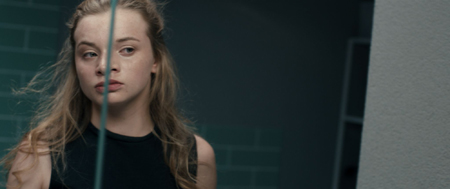 It’s entirely possible the movie would make more immediate sense to someone who’s had the experience of growing up female. The film’s concern with Mia’s physicality and sexuality are definitely gendered, in terms of how she explores them and how she’s threatened by that exploration. Her psychology might be clearer to people whose experience give them a better idea how to read the film’s metaphors. I found it opaque.
It’s entirely possible the movie would make more immediate sense to someone who’s had the experience of growing up female. The film’s concern with Mia’s physicality and sexuality are definitely gendered, in terms of how she explores them and how she’s threatened by that exploration. Her psychology might be clearer to people whose experience give them a better idea how to read the film’s metaphors. I found it opaque.
As a result, I found the story unengaging because it never felt especially dramatic. It seemed like a series of things that happen. Mia was in many ways passive, which makes some sense for the character we see, but which then means the action of the movie doesn’t rise as such. She makes an effort to get medical help, then turns away, not trusting her doctor; that’s all logical, but feels convenient and unlikely. Unlikely because her transformation’s so extreme it’s difficult to relate to her shying away from others — sure, you can say she’s reluctant to tell people what’s happening to her because of an instinct related to the transformation, but then you’re saying she’s being driven by inhuman character imperatives. It’s convenient because it makes it easier for the film to continue with its metaphor undisturbed. The transformation keeps going, inevitable, unsurprising.
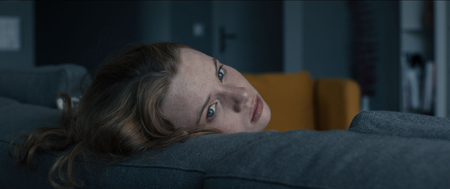 At the same time, the conclusion feels random. There’s an apartment that’s flooded to a point that should be architecturally impossible (or at least to a point it’d have to be noticed). There’s a choice made by Mia, the consequences of which she’s spared thanks to others. There’s a long drive after that, again a move that feels convenient. It’s as if the movie has to wrap up in some way, and the undeveloped plot’s pushed as it needs to be for that to happen. (I suppose it’s possible to read these scenes as a hallucination, but I didn’t get that sense at one viewing.)
At the same time, the conclusion feels random. There’s an apartment that’s flooded to a point that should be architecturally impossible (or at least to a point it’d have to be noticed). There’s a choice made by Mia, the consequences of which she’s spared thanks to others. There’s a long drive after that, again a move that feels convenient. It’s as if the movie has to wrap up in some way, and the undeveloped plot’s pushed as it needs to be for that to happen. (I suppose it’s possible to read these scenes as a hallucination, but I didn’t get that sense at one viewing.)
There are some very nice moments in this movie. The scenes of adolescent life are very strong. The acting’s solid. But with the plot as vestigial as it is, the film doesn’t come together. The genre elements are underplayed, and that’s a problem. Monsterism as symbol of adolescence is a strong basic concept, but I wasn’t sure how well elaborated it was. I will note that the particular monster into which Mia turns has an archetypal connection with female sexuality and a presentation as such in myth; and I will note that theme’s also present in the story of her attempt to fit in and generally to grow up. I can also imagine a number of ways to read the film as an expression of queer themes and growing up, but I can’t see a way by which those themes would help the plot cohere.
Perhaps, conversely, the problem is that there’s too much plot — if it were more random, more slice-of-life, it would feel less like a failed structure. But it is what it is, and that’s how I see it at one viewing. It’s a very strong debut, with lyrical images and a worthwhile commitment to character. I’d like to like it more than I do; it may be there’s an audience out there for it that simply doesn’t include me. But as I see it, for all the movie’s strong formal sense, it sets up narrative expectations it doesn’t fulfill.
Find the rest of my Fantasia coverage here!
Matthew David Surridge is the author of “The Word of Azrael,” from Black Gate 14. You can buy his first collection of essays, looking at some fantasy novels of the twenty-first century, here. His second collection, looking at some fantasy from the twentieth century, is here. You can find him on Facebook, or follow his Twitter account, Fell_Gard.